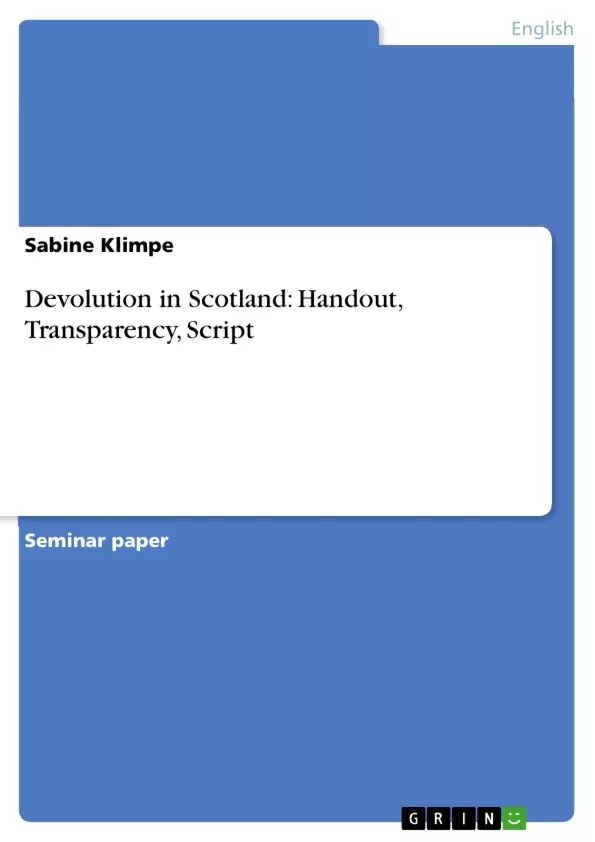A pact between scoundrels in the nation that sold their fellow citizens for English gold, wrote the great Scottish poet Robert Burns. The scoundrels he is speaking of are those noblemen who gave way to the English occupants because of bribery. Despite protests from the public, Scotland was united with England in 1707.
However, since the uniting of Scotland with England also had very positive aspects - for example, in the form of economic growth - the Scots initially accepted their fate. But later, when oil was found off the Scottish coast and Margaret Thatcher implemented her social policies that went against the grain of Scottish community spirit - the calls for more sovereignty became ever louder.
Since the late 1970s, devolution for Scotland and Wales has been under discussion. As promised in the Labour Party’s manifesto, referendums over the introduction of a certain level of self-government were held on September 11, 1997. The Scottish referendum produced a strong majority for a separate parliament (74%) with limited tax-raising powers (63% majority) on a turnout of over 60%. Scotland was expected to have a parliament within 12 months. In Wales, the result was a narrow majority, on a low poll, for a Welsh parliament. Unlike the House of Commons, the regional parliaments are to be elected by proportional representation
Inhaltsverzeichnis (Table of Contents)
- Introduction
- DEVOLUTION IN SCOTLAND
- The Scottish Parliament
- Timeline - Recent implementations of Scotland's quest for self-governance
- TRANSPARENCIES:
- People's opinions on Devolution
- NOTES FOR THE ORAL PRESENTATION:
- OVERVIEW
Zielsetzung und Themenschwerpunkte (Objectives and Key Themes)
This document aims to provide an overview of the history and context of devolution in Scotland, focusing on the establishment of the Scottish Parliament and its significance in the context of Scottish self-governance. It explores the arguments for and against devolution, examining the political, economic, and social implications of this shift in power.
- Historical context of Scotland's relationship with England
- The rise of Scottish nationalism and the desire for self-governance
- The establishment and powers of the Scottish Parliament
- The impact of devolution on Scottish politics and society
- Arguments for and against devolution, including economic, political, and cultural perspectives
Zusammenfassung der Kapitel (Chapter Summaries)
- Introduction: This section provides a brief historical overview of the relationship between Scotland and England, highlighting the key events leading to the union of the two countries in 1707. It also discusses the growing desire for greater Scottish autonomy in the 20th century.
- DEVOLUTION IN SCOTLAND: This section delves into the process of devolution in Scotland, starting with the discussions and referendums leading to the establishment of the Scottish Parliament in 1999. It outlines the key powers and responsibilities of the Parliament and highlights the significant impact of this shift in governance on various aspects of Scottish society.
- The Scottish Parliament: This section provides detailed information about the Scottish Parliament, including its composition, powers, and functions. It also discusses the political landscape in Scotland and the formation of the Partnership Government.
- Timeline - Recent implementations of Scotland's quest for self-governance: This section provides a chronological overview of significant events related to the Scottish quest for self-governance from 1997 to 2001, including the formation of the New Labour government, the Referendum Act, and the first Scottish Parliament Elections.
- TRANSPARENCIES: This section presents contrasting arguments regarding the benefits and drawbacks of devolution in Scotland and Wales, highlighting different perspectives on the issue.
- People's opinions on Devolution: This section focuses on public opinion towards devolution, analyzing the results of the 1997 Referendum and providing contrasting viewpoints on the legitimacy and impact of the decision.
- NOTES FOR THE ORAL PRESENTATION: This section offers a detailed introduction and background information relevant for an oral presentation on the topic of devolution in Scotland.
- OVERVIEW: This section summarizes the key points and historical milestones related to Scotland's journey towards self-governance, including the creation of the Scottish Home Rule Association, the founding of the National Party of Scotland, and the Kilbrandon Commission's recommendations.
Schlüsselwörter (Keywords)
Key themes and concepts explored in this document include devolution, Scottish nationalism, self-governance, the Scottish Parliament, political autonomy, economic development, social policy, and historical context. The text also delves into public opinion, contrasting perspectives, and the historical relationship between Scotland and England.
Frequently Asked Questions
What is "Devolution" in Scotland?
Devolution refers to the statutory granting of powers from the central government (UK Parliament) to a regional level, specifically the establishment of the Scottish Parliament in 1999.
When was the referendum for the Scottish Parliament held?
The historic referendum took place on September 11, 1997, resulting in a strong 74% majority in favor of a separate parliament.
What powers does the Scottish Parliament have?
The Scottish Parliament has self-governing powers over various regional issues and limited tax-raising powers, as decided in the 1997 referendum.
Why did the calls for Scottish sovereignty increase in the 20th century?
Key factors included the discovery of oil off the Scottish coast and political opposition to Margaret Thatcher’s social policies, which many felt contradicted Scottish community spirit.
How are the regional parliaments elected compared to the House of Commons?
Unlike the House of Commons, which uses a first-past-the-post system, the regional parliaments in Scotland and Wales are elected using proportional representation.
- Citar trabajo
- Sabine Klimpe (Autor), 2002, Devolution in Scotland: Handout, Transparency, Script, Múnich, GRIN Verlag, https://www.grin.com/document/13531



